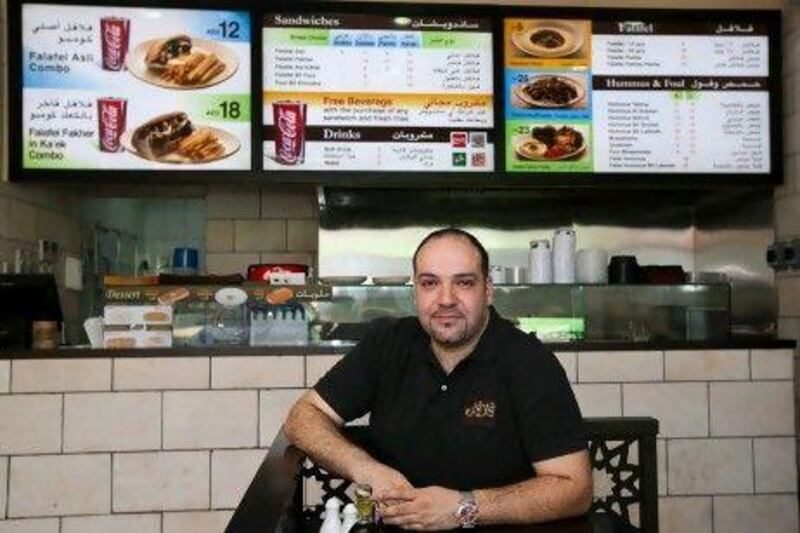Dukkan Falafel opened its first restaurant only late last year. But the franchise, based in Dubai, already has plans to become the world's biggest falafel chain by 2015.
Video:Dukkan Falafel reveals ambitious expansion plans
Already in operation in 18 locations within Dubai, Dukkan Falafel aims to open more franchises in UAE, India and the US.
[ Watch this video in full screen here ]
Ambitious? Certainly. Yet the company already has four of its outlets open in Dubai and has signed up 18 franchisees across the Emirates that are set to open over the coming months.
Dukkan Falafel also has plans to expand across the GCC, India and ultimately the US.
"We sold our first franchise (in the UAE) before even opening our first outlet, based on the idea," says Rami Wardeh, the chief executive and co-founder of Alternative Dining, the company that owns Dukkan Falafel.
The company is targeting individual investors rather than large corporations, which have traditionally owned and operated franchises in the UAE. "What we are doing, and what other people are starting to do, is to target individuals, an executive, so instead of them investing in gold or the currency or stock market, they go and buy an individual business," says Mr Wardeh.
"We don't look for people with restaurant experience, because we are transferring the know-how to the investors with support."
Alternative Dining hopes to sell 35 to 40 franchises in the UAE by the end of next year, but the market that holds the biggest potential for the company is the US.
It is planning to open two 3,000 square feet flagship outlets in Los Angeles and Las Vegas in tandem next year, which will show how the restaurant's concept works. The company will then formally launch the franchise in the US.
"In the US we're not going to do franchises individually," says Mr Wardeh.
"We're going to do areas, so we're working on dividing each state into counties and each county will have one franchisee. What we will do is we will appoint a franchisee as an area development for this county. He has to open one franchise for himself, and then he has the right to sub-franchise again." The company is aiming to open 500 shops in the US by 2015, a further 200 in the Middle East and 150 to 200 in India, which will be divided into regions. "Wherever we go we're going to build the infrastructure (first), which includes the support office and the facilities to do the production for the food," says Mr Wardeh.
But why the aggressive expansion?
"I believe in the saying 'if you build it they will come'," says Mr Wardeh. "We have the know-how to operate the business. We went through an exercise with our four shops. We know the mistakes that we made in terms of costing etc.
"I feel that the stronger the launch, the better the return we will have in terms of brand awareness."
The push will certainly be risky. While falafel has traditionally been considered an "ethnic" food, says Mr Wardeh, he and Alternative Dining are aiming to take it mainstream. "We want it to compete with fast-food chains and not falafel chains," he says. "That is our aim. Next time you go to eat a burger or a pizza, we want you to think of us." The franchising industry, which is growing at a rate of 27 per cent annually in the Middle East, is attractive because it involves lower risk than starting a business from scratch, experts say.
"People invest in franchises because they do not have to reinvent the wheel," says Pankaj Gulati, the general manager of Dubai operations at Franchise Middle East, which runs the Franchise UAE trade show that ended yesterday.
He says there are a number of home-grown franchises that could easily expand outside the region.
"(Dukkan Falafel) is a brilliant concept. Falafel was supposed to be a poor man's food but they have (redesigned) it," says Mr Gulati.
[ gduncan@thenational.ae ]






